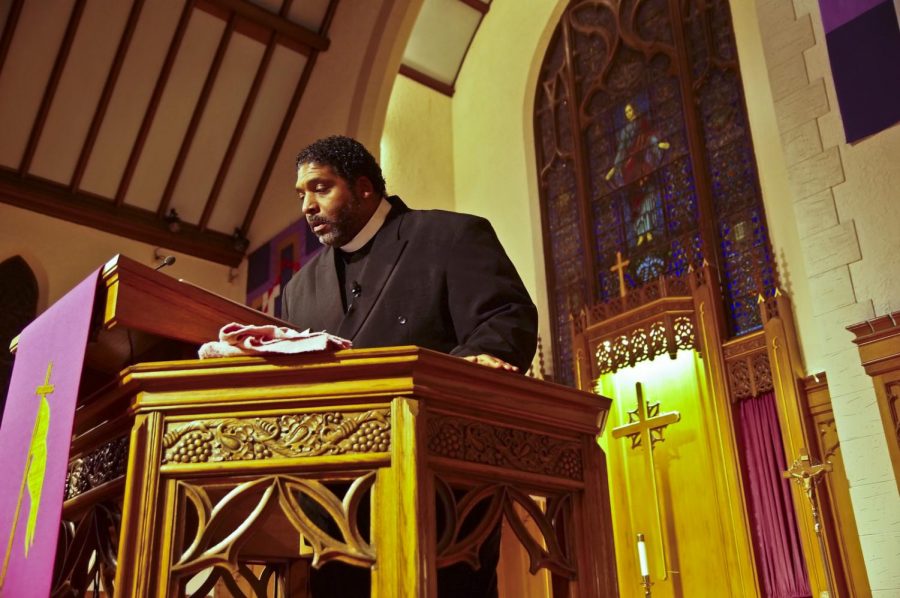As part of the annual Feinberg Lecture Series at the University of Massachusetts, noted Protestant minister and activist Rev. Dr. William J. Barber II gave a talk regarding race and political division in America at the Fine Arts Center on Thursday evening.
Each year, the history department at the University coordinates the series of high-profile lectures to discuss a certain topic. This year, the theme is “Another World Is Possible: Revolutionary Visions, Past and Present.”
The keynote address was the inaugural “James Baldwin Lecture” at the University, which has a stated goal to address issues regarding social and political justice in the context of the larger discussion of institutional racism. The address is named after the prominent black author and social commentator James Baldwin. Barber began his address by recounting the famous novelist’s life.
“Before we talk about LGBTQI, Baldwin in 54, 1954, dared to write ‘Giovanni’s Room’,” Barber said. “And he had a complex description of homosexuality then, he was helping the world then recognize that we are all complex, and no one label defines us and no part of us gives anybody the power or the authority to discriminate against us.”
Barber continued to recount Baldwin’s work after “Giovanni’s Room,” explaining the boundaries that had been pushed by the author in the period of America’s civil rights movement. But one book, “The Fire Next Time,” published in 1963, struck Barber the most.
“He wanted to help his white brothers and sisters but wrote it so they could see what African-Americans see when they look at society,” Barber said. “Inside of that book is hope, it is hope and belief that we could get it right, or we would never get it right, until we told the truth. And the truth must precede reconciliation. There is no reconciliation without truth, honesty and repentance.”
Barber then shifted focus to what he called “the fire this time,” critiquing the status of an America that he described as having “a split personality, a political and social schizophrenia.” The dueling dichotomy of America’s stated values compared to how it treats marginalized communities in practice lays the broken foundation to the country’s division, he argued.
“If you understand basic history, the first thing you must come to grips with is we need a deeper analysis in this moment,” Barber said. “And it’s not enough to say it’s just Trump. In fact, that’s a mistake. To make Trump the culprit alone is to not understand what led to Trump and his enablers.”
Barber continued to discuss the history of the civil rights movement, explaining the Republican electoral strategy dubbed the “Southern strategy” which aimed to increase white support in Southern states by appealing to racism against African-Americans.
“That strategy, when it was finally put together around 1968, had a goal of lasting 50 years. And this is the 50th year,” Barber said. “The Southern strategy was a strategy deliberately designed to play the race card … and for Southern whites to not join with poor blacks and poor Latinos to be a power. The goal was to keep that alliance from ever happening in the South and for it to work in the racist enclaves of the North.”
Barber argued that the history predating Donald Trump’s presidency made way for racist sentiments to be so mainstream. Even Democrats, he said, were partly to blame for Trump, as they rarely engaged the issue of race.
“Instead, Democrats wanted to talk about some strange neoliberalism. That when you stopped saying the word poor, you can stop talking about race and instead you can talk about the middle class,” Barber said.
In spite of all of the pandemonium surrounding American politics, Barber explained that there might be a silver lining. Trump, he said, might be a “strange blessing” to the country since he “can’t keep his mouth shut.” In Barber’s view, this might wake some Americans to see the reality of the current political situation.
Concluding his address, Barber explained that the current moment is not just about the policies of one man in the nation’s highest office, but rather about the history and the future of the United States.
“Right now, we are in the middle of a third reconstruction. The very future of America is on the line,” Barber said. “American needs more than a new president, we need a moral revolution and a moral revival that says we understand that some of us have been told once again to be the conscience of this nation.”
After the event, UMass graduate of music education Paul Kinsman said that he found Barber’s address to be of great importance in today’s political climate.
“I teach a social justice course, and I found the lecture to be really amazing. This moment is about whether or not we choose to do something,” Kinsman said.
Another attendee, Elise Ghitman, a Greenfield Community College sophomore studying sociology and English, said that she found the lecture inspiring.
“It’s not so much about Trump, but it’s about how there are systemic issues in America,” Ghitman said.
Michael Connors can be reached at [email protected] or followed on Twitter @mikepconnors.





















Jean Wright • Sep 23, 2018 at 5:46 am
Would you email me full text of his speech. Your article well-written. Thank you.
amy • Sep 21, 2018 at 6:36 pm
Where are the Asians talking about race.racism.. the history of racism they faced??
Oh wait.. they are none because umass doesn’t involve them. Only black people who are a victim of racism need apply.